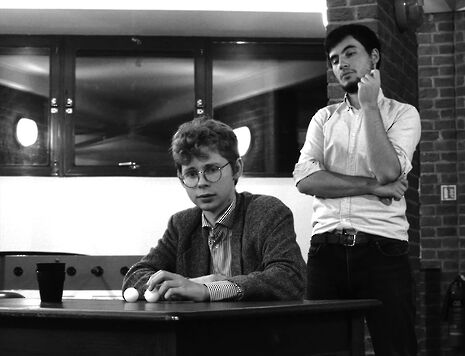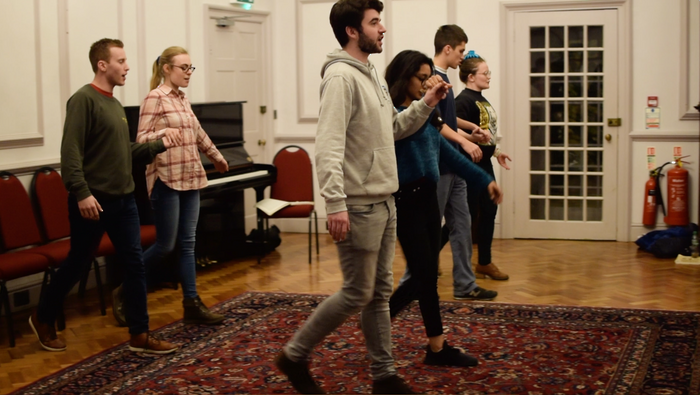Latin Play 2018: Thyestes preview
The first ever Cambridge Latin play tackles the ‘unplayable play’ with a great triumph

Time to hold our breath! This week will bear witness to the first ever Latin play to be performed on the Cambridge stage.
We often tend to shy away from foreign theatre and the exotic magic that it offers, intimidated by the ever-present language barrier. We suppose it to be a luxury that only native speakers get to partake in. Alex Tadel’s production of Seneca’s Thyestes, however, challenges this assumption by going to great lengths to make it accessible for everyone in the audience – despite the millennial language barrier between us and the inhabitants of ancient Rome.
The gap is bridged with the help of synchronised subtitles as well as visually appealing set and costume, which stimulate our engagement with the events unraveling on stage and not just the translation on the screen. In fact, having had the honour of being present at one of the rehearsals, I can confidently say that this production of Thyestes can work almost equally well without the aid of the subtitles –and I don't know a single word of Latin! However, its innate musicality, combined with the gentle rhythm of the metre, makes Latin a perfect vessel for the conveyance of raw feeling. While the precise meaning of words may be inaccessible from listening to the characters’ speech alone, the rich emotional scope of the script, coupled with the brilliant, highly nuanced performance of the actors, engages us on a whole different level of psychological signification. In fact, I felt more attuned to the characters’ emotions precisely because the words’ meaning was lost on me.
"the modern style of acting introduces a new dimension to the well-known piece - it illuminates the psychology of the characters"
Famously, Seneca’s Thyestes is considered an ‘unplayable play’ – its many incongruous technicalities and lack of inherent theatricality hardly allow it to be made sense of as a play at all. Of course, this production does not falter at the challenges it encounters along the way. In order to achieve consistency and realise the text’s underlying theatrical potential, the production’s dedicated director, Alex Tadel, has carefully abridged Seneca’s original text. In her studious selection process, Tadel also stripped away all the inaccessible political passages dispersed throughout the play, which left her with the beautiful polished diamond encrusted into its core – the deeply personal tragedy of the two twin brothers. This diminishing of the dividing space between us and them has created a possibility for the story to be relevant to us today, however horrific the central action of the play may be.
Some elements of the play were also modified in order to refine this delicate balance between the contemporary and the antique. The chorus has been transformed into a single female character, who is personally involved in and affected by the play’s action. This thoughtful touch enables the production to offer a female perspective from within the action on the events of what has been originally written as an all-male play. Moreover, the modern style of acting introduces a new dimension to the well-known piece - it illuminates the psychology of the characters. We discover great nuance concealed beneath seemingly straightforward motivations. Michelangelo Chini lets us peek into the emotional conflict, which afflicts the mind of his character Atreus: "The play portrays Atreus in the spectacular moment of extreme anger. It makes him stand out as a powerful figure. But ultimately this pivotal moment also showcases his vulnerability and insecurity."
Tadel’s production of Thyestes is an exploration of the space beyond the limits of morality and even humanity. Its action is grotesque, shocking and horrifying – and yet so intense, thrilling and demanding of attention that we cannot look away. The experience of being in the audience of this production verges on emotional intrusion – its engrossing effect is so complete that I felt as though I too was a part of the play’s strange universe. It is the production’s exceptional ability to immerse that allows us to access the very different and unfamiliar but for that all the more exciting world of antiquity unfolding on stage.
And just like that, what has been deemed the ‘unplayable play’ time and time again is rapidly coming alive, thanks to the brave efforts of the production team and cast.
Cambridge Latin Play 2018: Thyestes by Seneca is being performed at 7.30pm from the 12th-15th November at Fitzpatrick Hall, Queens’ College.
 Interviews / You don’t need to peak at Cambridge, says Robin Harding31 December 2025
Interviews / You don’t need to peak at Cambridge, says Robin Harding31 December 2025 News / Unions protest handling of redundancies at Epidemiology Unit30 December 2025
News / Unions protest handling of redundancies at Epidemiology Unit30 December 2025 Comment / What happened to men at Cambridge?31 December 2025
Comment / What happened to men at Cambridge?31 December 2025 Features / ‘Treated like we’re incompetent’: ents officers on college micromanagement30 December 2025
Features / ‘Treated like we’re incompetent’: ents officers on college micromanagement30 December 2025 Theatre / We should be filming ADC productions31 December 2025
Theatre / We should be filming ADC productions31 December 2025








